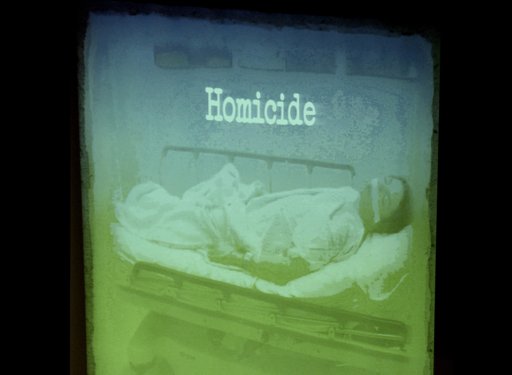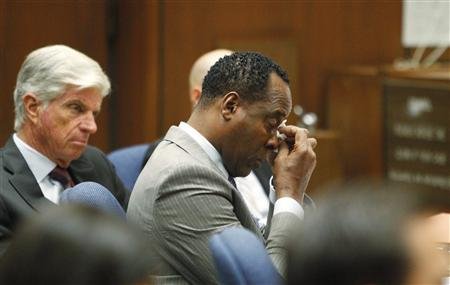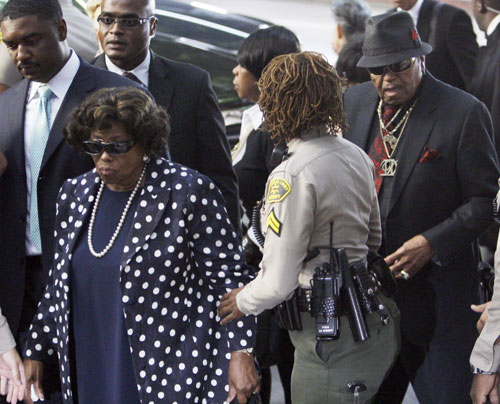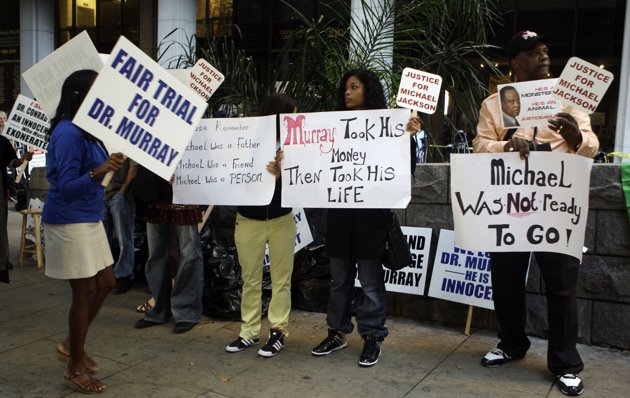
The trial of Michael Jackson's doctor begins
China.org.cn, September 28, 2011
-

Prosecution exhibit photo projected on the screen in the courtroom during the trial of Michael Jackson's doctor shows the body of Michael Jackson lying dead on a gurney.
Images of Michael Jackson lying dead in a hospital and rehearsing the day before his death, along with recollections of the singer as a troubled "lost boy," made for a heart-wrenching opening in Los Angeles on Tuesday to the manslaughter trial of the doctor hired to care for him.
First, prosecutors showed a photo of Michael Jackson's pale and lifeless body lying on a gurney. Then, they played a recording of his voice, just weeks before his death.
Slow and slurred, his words echoed Tuesday through a Los Angeles courtroom at the start of the trial of the doctor accused of killing him. As a worldwide audience watched on TV and Jackson's family looked on from inside the courtroom, a drugged Jackson said:
"We have to be phenomenal. When people leave this show, when people leave my show, I want them to say, 'I've never seen nothing like this in my life. Go. Go. I've never seen nothing like this. Go. It's amazing. He's the greatest entertainer in the world.'"
In opening arguments two years after Jackson's death by drug overdose of propofol and sedatives, prosecutor David Walgren told jurors the "Thriller" singer "literally put his life in the hands of Dr. Conrad Murray."
"That misplaced trust in the hands of Conrad Murray cost Michael Jackson his life," Walgren said.

Dr. Conrad Murray (C) wipes a tear during the opening arguments in his trial in the death of pop star Michael Jackson in Los Angeles September 27, 2011.
But Murray's lawyers argued Jackson "caused his own death" by giving himself extra medication in a bid to sleep. "He died so rapidly, so instantly, he didn't even have time to close his eyes," defense attorney Ed Chernoff said in opening arguments.
Murray denies he is guilty of the involuntary manslaughter of Jackson on June 25, 2009, but admits giving the 50-year-old pop star a dose of the powerful anesthetic propofol as a sleep aid. He faces a prison sentence of up to four years if convicted. The trial is expected to last four to six weeks.
The Texas cardiologist, who was paid $150,000 a month to care for Jackson, wiped away tears during Tuesday's opening statements as Chernoff defended him.
Jackson's lifeless body was found at his rented Los Angeles mansion just three weeks before a series of 50 planned London comeback concerts titled "This Is It" were scheduled to begin.
Kenny Ortega, the co-director of the concerts, testified that Jackson was excited about the shows because he wanted his young children to see him perform.
But on June 19, six days before his death, Jackson turned up at rehearsals in Los Angeles in a worried state. "Michael seemed chilled, lost and incoherent," Ortega recalled.

Michael Jackson's parents Katherine and Joe Jackson arrive as the involuntary manslaughter trial for Dr. Conrad Murray, Jackson's personal physician when the pop star died, gets underway at the Criminal Justice Center in Los Angeles Tuesday, Sept. 27, 2011.
"I was feeding him, wrapping him in blankets to warm his chills, massaging his feet to calm him and calling his doctor," Ortega wrote in an email to concert promoters hours later. "It broke my heart. He was like a lost boy ... He is terribly frightened it is all going to go away," Ortega put in the email.
Four days later, Jackson was back "full of energy, full of desire to work, full of enthusiasm," Ortega said. Ortega hugged Jackson goodbye after another good day of rehearsals on June 24. On June 25, the director and choreographer said he got a call saying "We lost him."
Chernoff told jurors Murray was trying to wean the pop star off propofol, which Jackson called "milk."
He argued that a frustrated Jackson, tired and under pressure to get the concerts ready, gave himself eight lorazepam anti-anxiety pills to sleep in the early hours of June 25. When he still could not rest, he added propofol.
"We believe the evidence will show... that when Dr. Murray left the room, Michael Jackson self-administered a dose of propofol that with the lorazepam created a perfect storm within his body that killed him instantly," Chernoff added.

Demonstrators for and against make their case as the involuntary manslaughter trial for Dr. Conrad Murray, Michael Jackson's personal physician when the pop star died, gets underway at the Criminal Justice Center in Los Angeles Tuesday, Sept. 27, 2011.
"The whole thing is tragic, but the evidence is not that Dr Murray did it," Chernoff said.
Walgren opened the prosecution case by showing jurors a photo of a thin Jackson lying dead on a hospital gurney. He later played video of Jackson's last performance -- an emotional rehearsal of "Earth Song" filmed on June 24, 2009.
Footage of the rehearsals was made into Jackson's posthumous concert movie "This Is It" in 2009 and it became a global box office hit.
A number of Jackson's family members were in the courthouse, including his father Joseph, mother Katherine, sisters LaToya and Janet, and brothers Jermaine, Randy and Tito. LaToya Jackson carried a sunflower, her brother's favorite flower.
The family's most emotional moment came when the prosecutor played a video excerpt from Jackson's "This Is It" rehearsal in which he sang "Earth Song," a plea for better treatment of the environment.
As Jackson sang the words, "I used to dream. I used to glance beyond the stars," his mother, Katherine, dabbed at her eyes with a tissue.
Dozens of fans outside the courtroom held sunflowers, pictures of the dead pop star, and placards saying "Justice for Michael."